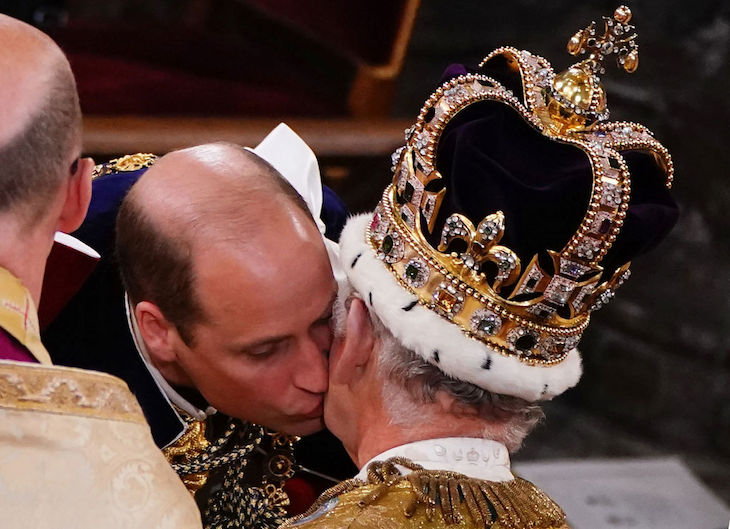For the first time, the true extent of the property held by the King and the Prince of Wales’s private estates, the Duchies of Lancaster and Cornwall has been revealed, according to a splashy Sunday Times investigation. There are 5,410 separate properties up and down the country paying millions of pounds annually in rents and fees and charges. The NHS pays to warehouse its ambulances, the Navy pays for the use of jetties, charities rent London office blocks, and money rolls in for everything from the training of troops on Dartmoor to the housing of prisoners in a jail on His Maj’s land. ‘Revealed,’ the headline hoots, ‘The property empires that make Charles and William millions.’
Charities don’t get free stuff just by virtue of being charities
Is the discovery that the King is rich shocking? Probably not. Is the King’s making money out of that property shameful? Again, probably not. There’s an awful lot to disentangle, there. In the first place, we’re implicitly invited to disapprove of the sheer size of the landholdings that the King and Prince of Wales own – it being pointed out that a good deal of the 180,000 acres of land they own between them are ‘largely made up of land and seashores seized by kings in the centuries immediately after the Norman Conquest’. Jolly unfair, we may think. But that ship has sailed. There’s no plausible political or legal mechanism to expropriate all these royal goodies and return them to the descendants of whichever Angle-Saxon thegn they originally belonged to.
So, given that, like it or not, these are private properties owned by the King and Prince, it’s not unreasonable that they should rent them out. If they rent them, in some cases, to taxpayer-funded organisations such as the NHS or to charities, that might press the buttons emotionally but it’s not a sign of wickedness or rapacity. Are we to propose that in their private capacity, members of the royal family should be subject to different rules on commercial behaviour from the rest of us?
Charities don’t get free stuff just by virtue of being charities. Their chief executives, notoriously, don’t work for peanuts; and nor are they exempt from paying for stationery, computers, motor vehicles, the printing of leaflets, buildings or the rent for their offices. The taxpayer-funded NHS pays for stethoscopes from the companies that make stethoscopes, and where its hospitals and offices are on private land it pays rent for them. Sure, it might have been nice for the King to waive the £10,000 a year he gets to allow the Navy access to the oil depot at Devonport it uses to fuel – ahem – His Majesty’s warships. But the essential principle holds
Where the principle doesn’t hold, and should, is in two respects. At the root of this question, a distinction is made when it comes to property between the King as King, and the King as private citizen; a King’s Two Bodies issue, you could say, for the 21st century. On the one hand there’s the Crown Estate and the Sovereign Grant – which are properties held on behalf of the monarch qua monarch, and which fund the Royal family’s monarch-y stuff: upkeep of Buck House, provision of bagpipers for state occasions, replacement of red carpets, cleaning of ermine, lardering of posh scran to feed visiting foreign dignitaries etc.
On the other, there is the private wealth of the King and other members of the Royal Family. It is into this category that the Duchies of Lancaster and Cornwall fall. The more egalitarian among us may not like the vast extent of that private wealth, and we may even point out that the ancestors who accumulated it didn’t exactly do so on ordinary commercial terms. The ‘private’ wealth of the King is downstream from the royal privileges and military might of his ancestors. But that has never exactly been a secret, it’s not a revelation now, and there’s not much chance of changing it unless we fancy having another revolution.
But if it is to be regarded as private wealth, the same rules should apply to it as to private wealth held by any of the rest of us. In two respects, it doesn’t. The first is transparency: even when Parliament asked for a full list of the properties held by the Duchies of Lancaster and Cornwall in 2005, they were rebuffed. It has taken the Sunday Times’s investigative team months of painstaking work to build up a picture of the King and Prince’s holdings around the country. They have had to match property reference numbers to land titles, plot them on a digital map, and expend hours of shoe-leather reporting to obtain details of leases and contracts. If these properties are, indeed, held by the King and his son in such capacity as they have as private citizens, they should be right there on the Land Registry in the same way anyone else’s property is.
The second, and more important, anomaly is this: His Majesty and His Highness have struck a special deal with the Treasury for the Duchies which means they are exempt from both capital gains and corporation tax, and don’t have to comply with property laws such as compulsory purchase orders. I cannot for the life of me see why that should be, if it’s right that these are properties ultimately held privately by these men. You cannot simultaneously claim the rights of a private citizen and the privileges of a monarch. That is to attempt to ride, as has sometimes been said, two horses with one arse. Let it be private wealth, but let its owners be treated as private citizens before the law in every respect – not just the ones they like the sound of.








Comments